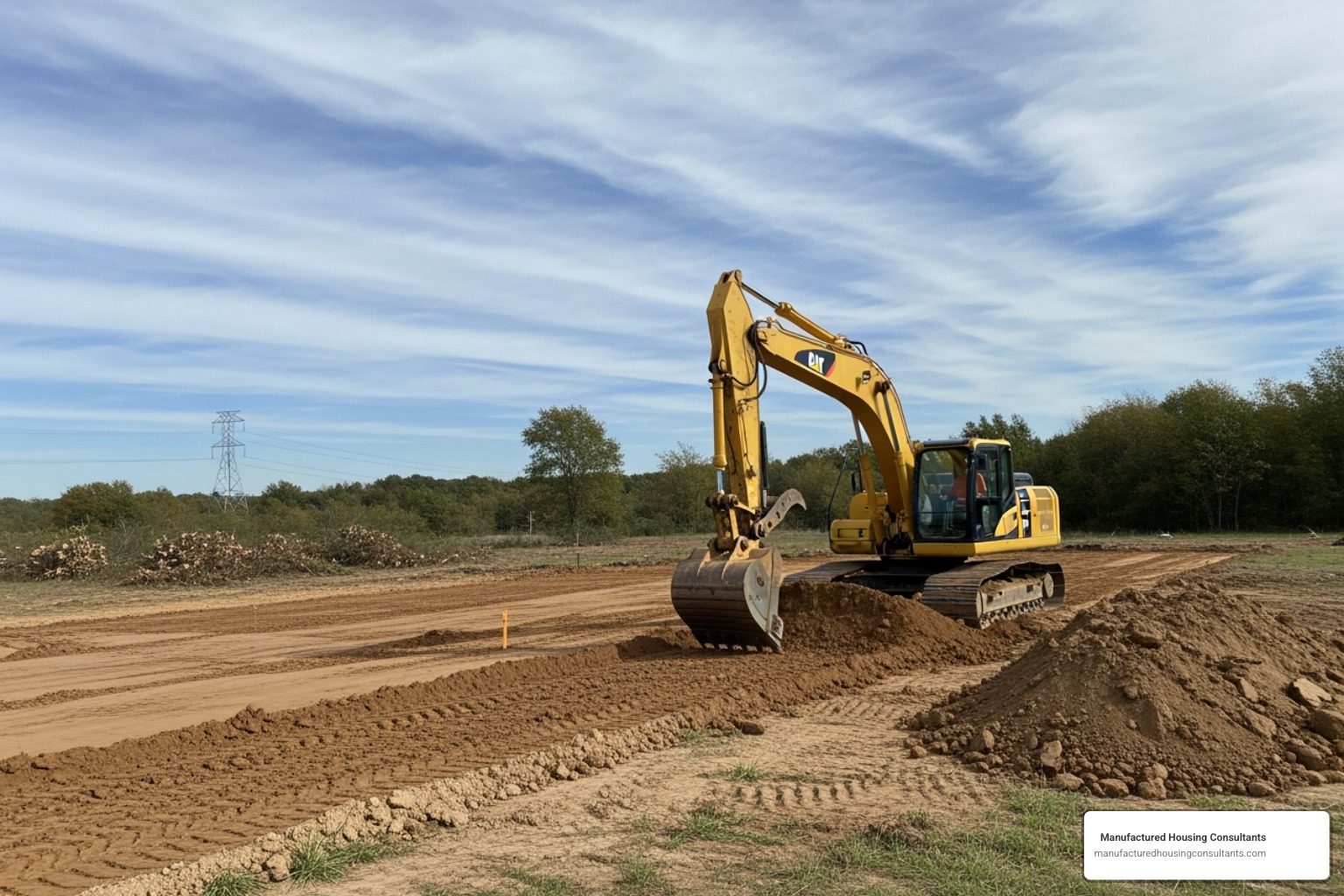Why Site Preparation Makes or Breaks Your Mobile Home Investment
Site preparation for mobile homes is the critical foundation work that determines whether your new home is a smart investment or a costly nightmare. It’s not an optional expense—it’s the difference between a home that appreciates in value and one that develops foundation cracks, water damage, and settlement issues.
Here’s a quick overview of what’s involved:
The Essential Steps for Manufactured Home Site Prep:
- Planning & Permits: Secure building permits, verify zoning, and conduct land surveys.
- Clearing & Grading: Remove obstacles and create proper drainage slopes.
- Foundation: Install a stable base like a concrete slab, pier & beam, or caliche pad.
- Utilities: Connect water, sewer/septic, electrical, and gas services.
- Finishing: Add skirting, driveways, and landscaping.
Timeline: 2-8 weeks, depending on site complexity.
Cost Range: $15,000 to $50,000+ for most Texas properties.
Critical Factor: Start permit applications at least 6 weeks before delivery.
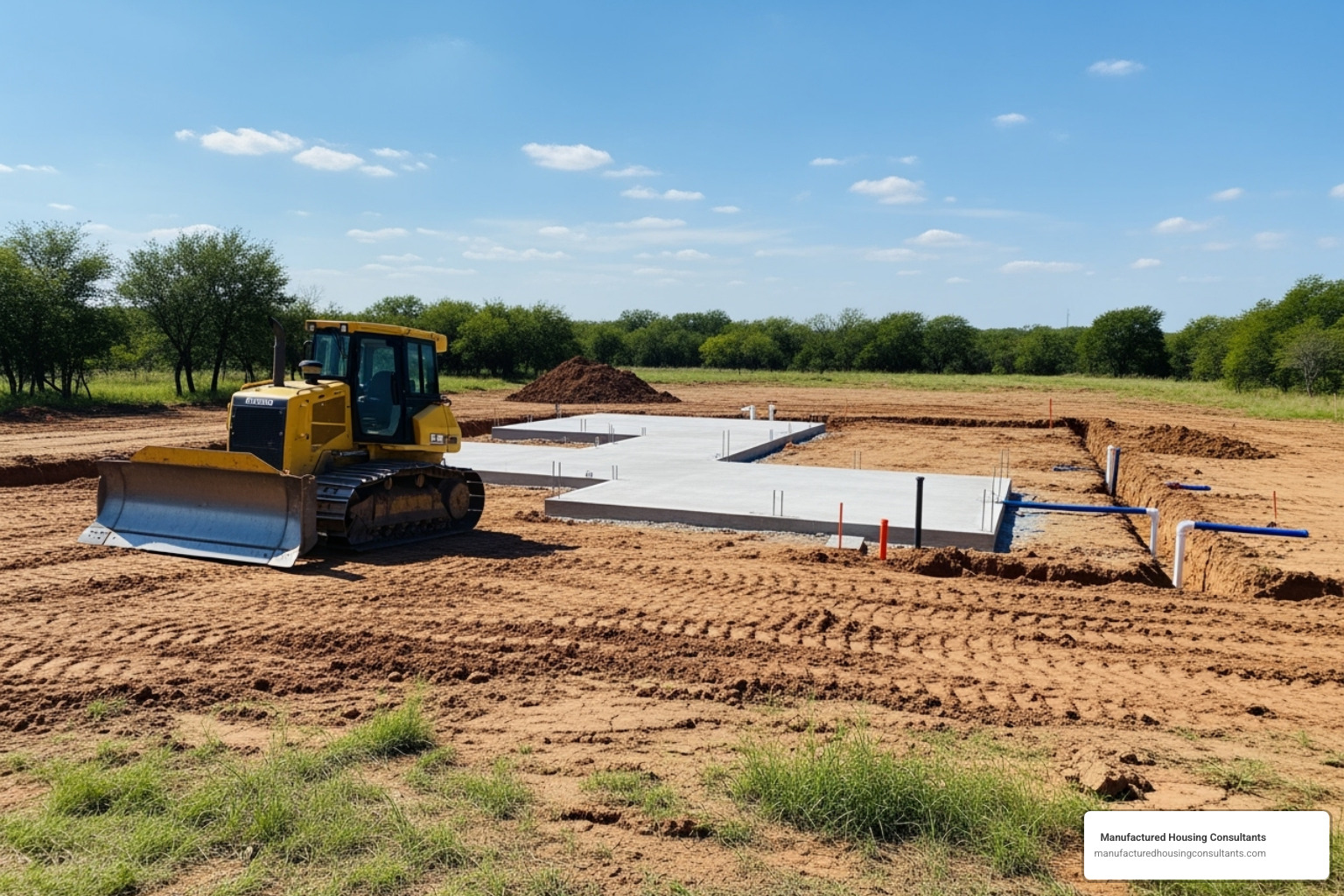
The good news is that site prep for manufactured homes is simpler than for site-built construction. The entire site can be prepared while your home is being built in the factory, saving months of construction time. As consultants serving the San Antonio area, Manufactured Housing Consultants specializes in managing this entire process. It’s important to clarify that we do not perform the physical land clearing or construction ourselves; instead, we act as your project manager, coordinating and overseeing licensed contractors to ensure every step is done right.
For Texas homeowners, especially in our service locations around San Antonio, our unique climate and soil conditions require specific approaches to grading and foundation work. This guide walks you through each phase, helping you budget realistically, avoid common pitfalls, and ensure your manufactured home sits on solid ground for decades to come.
The Blueprint for Success: A Step-by-Step Guide to Site Preparation for Mobile Homes
Getting your land ready for a manufactured home is about building the foundation for your family’s future. When done right, site preparation for mobile homes creates a stable, dry, and secure base that protects your investment for decades. We’ve broken the journey into five clear phases.
Phase 1: Planning, Permits, and Texas Regulations
Before any dirt moves, the planning phase ensures your project is legal and on track. A professional land survey is your first, non-negotiable step to define property boundaries and identify easements. Next, investigate local zoning laws and deed restrictions. What’s allowed in Bexar County might be prohibited one county over, so confirm that manufactured homes are permitted. You can find helpful principles for checking local rules by understanding zoning bylaws in your area.
Permits are your official green light. You’ll need building and utility permits from local offices in the San Antonio area, overseen by the Texas Department of Housing and Community Affairs (TDHCA). Our golden rule: start permit applications at least six weeks before your home delivery to avoid costly delays. You’ll also need to adhere to setback requirements—the minimum distance your home must be from property lines and roads. If this seems overwhelming, our Land Location Services can guide you. Please note, while we help you find and evaluate land, Manufactured Housing Consultants does not sell land directly.
Finally, decide where the home will sit. This involves more than just the view; consider accessibility for delivery trucks, sun exposure to reduce energy costs, and future plans for a garage or deck. For more on evaluating land, see Buying Land for Mobile and Manufactured Homes Part 1.
Phase 2: Breaking Ground and Proper Grading
With permits in hand, it’s time to reshape the land. This phase transforms your property into a stable, properly drained home site.
Site clearing involves removing all obstacles like trees, stumps, and rocks from the building pad. Following that is the most critical step: grading for drainage. Water must flow away from your home. Improper drainage is a leading cause of foundation settling and water damage. We achieve this by creating a “crown,” where the home pad is slightly liftd and the ground slopes away on all sides. HUD requirements for installation mandate at least a 5-6 inch drop over the first 10 feet.
A soil test ($500-$1,000) is a smart investment to check the land’s bearing capacity and identify issues like expansive clay common in Texas. After grading, we compact the soil to prevent future settling. Given Texas’s heavy rains, erosion control measures like silt fences are crucial to protect your work.
Finally, we plan clear access routes for delivery. A massive carrier needs a wide, stable path with no tight turns or low-hanging branches. Double-wide homes require even more clearance, so we coordinate carefully with delivery teams to ensure a smooth arrival.
Phase 3: Choosing the Right Foundation for Your Home
The foundation provides stability and protects your home from ground moisture. In Texas, your choice can also determine if your home qualifies as real property, which can improve its appreciation potential.
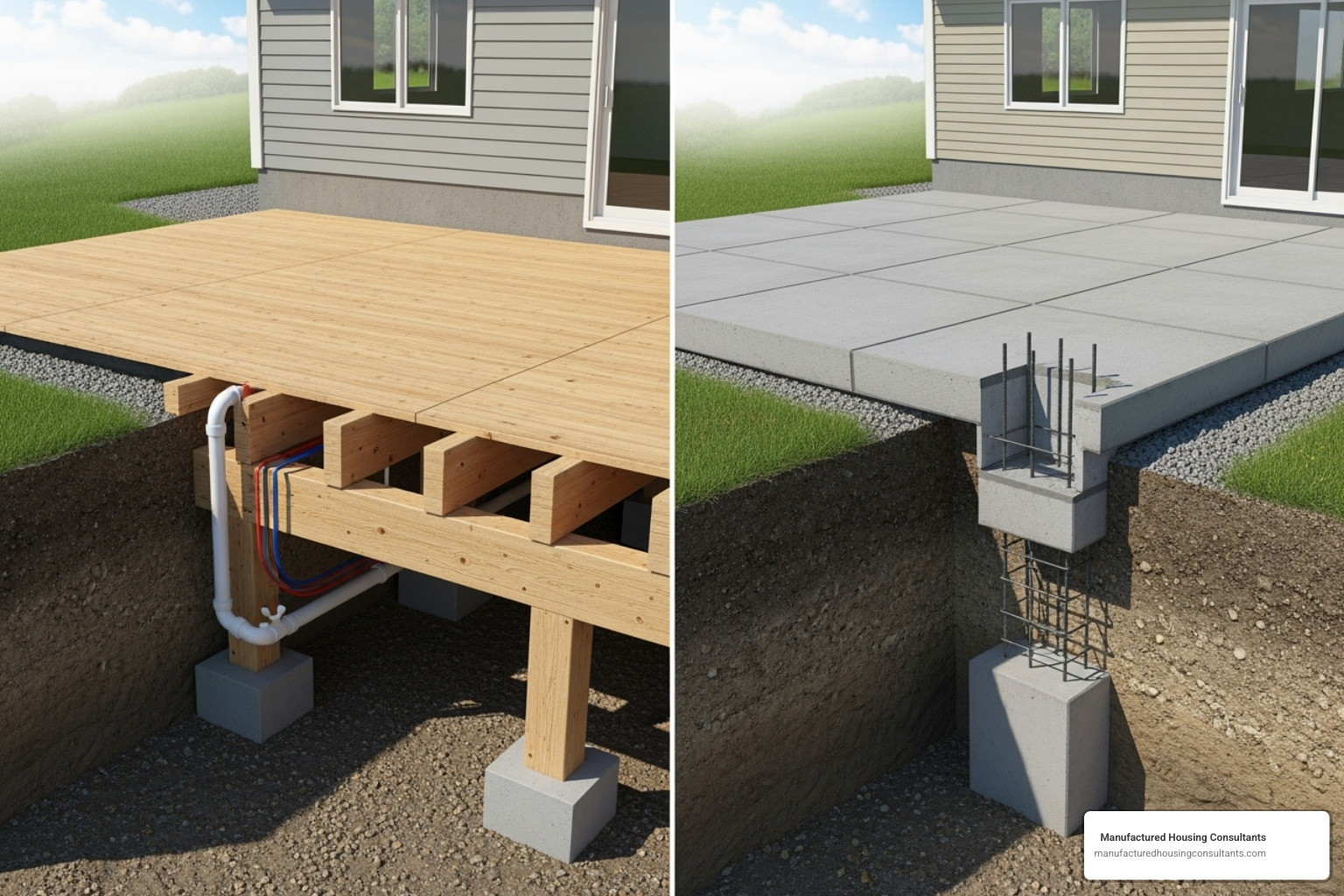
Here are the three common foundation types for manufactured homes in Texas:
| Foundation Type | Pros | Cons | Typical Texas Cost (Est.) |
|---|---|---|---|
| Caliche Pad | Most common and bank-accepted; acts like natural cement; good drainage base; relatively quick to install. | Not considered a permanent foundation by all lenders/areas; can still shift over time without proper compaction. | $2,500 – $5,000 |
| Pier & Beam | Cost-effective; excellent for uneven or sloped terrain; allows for easy access to utilities underneath; good for flood-prone areas. | Not always considered a permanent foundation; less visually appealing to some; can be susceptible to pest intrusion if not properly skirted. | A few thousand dollars |
| Concrete Slab | Provides maximum stability; can classify home as real property (FHA/VA loans often require); excellent for tape-and-textured walls (reduces stress cracks); good for flood-prone areas. | More expensive upfront; not suitable for highly sloped lots; utility access more difficult post-installation; requires significant curing time. | $6,500 – $12,000 |
Note: Basement foundations are not included here, as they’re uncommon for Texas manufactured home installations due to cost, soil conditions, and flood risk considerations.
Caliche pads are the most common choice in Texas, compacting into a concrete-like surface. Pier and beam foundations are ideal for sloped lots, elevating the home on concrete piers. Concrete slab foundations offer maximum stability and are often required for FHA/VA loans, which can reclassify the home as real property and improve financing options.
The choice between a permanent and non-permanent foundation is crucial for your home’s long-term value. We also account for the frost line in colder parts of Texas and plan for concrete curing time to avoid delivery delays. For a deeper look at your options, visit our Modular Home Foundation Types page.
Phase 4: Connecting Utilities in Texas
With the foundation ready, it’s time to connect the utilities that make a house a home. This involves bringing water, waste, and power to your site.
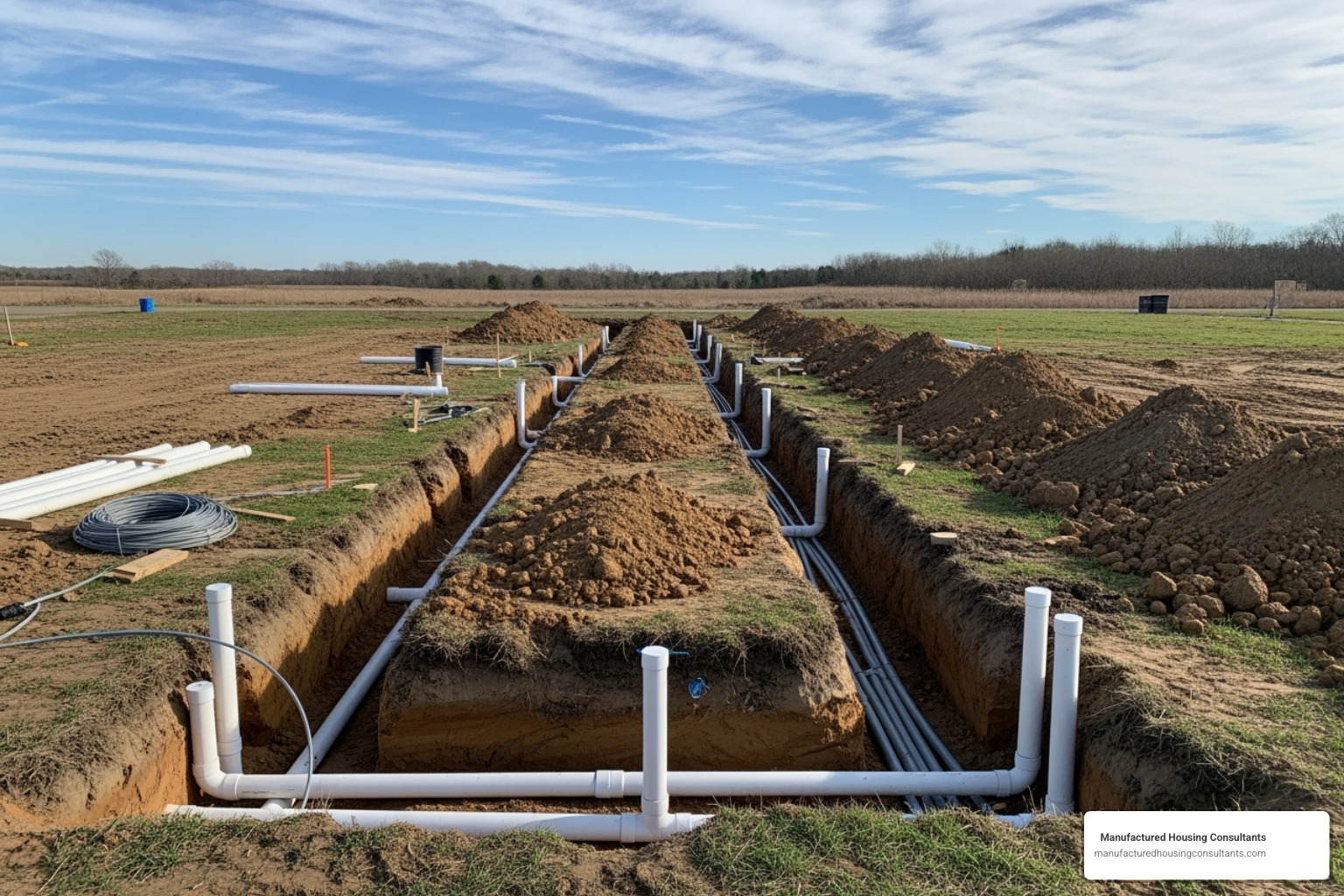
For water and sewer, you’ll either connect to municipal lines or, on rural properties, install a private well ($5,000-$15,000) and a septic system ($6,000-$20,000). Septic systems require soil percolation tests and special permits. Electrical service must be installed by a licensed electrician, and costs can rise significantly if power lines need to be extended to your property. For gas, you’ll connect to a natural gas line or use a propane tank for heating and cooking.
To save money, we coordinate trenching for multiple utilities at once where codes allow. Before any digging, we always call 811 to have underground lines marked, preventing dangerous and expensive accidents. Our Utility Connections Services can manage this complex process for you. It’s important to understand that while we coordinate these efforts for our clients in the San Antonio region, we do not perform the well drilling, septic installation, or electrical line work ourselves. We work with licensed specialists to ensure everything is connected properly and passes inspection.
Phase 5: Land Improvements and Finishing Touches
The final phase transforms your property from a construction site into a welcoming home, boosting curb appeal and functionality.
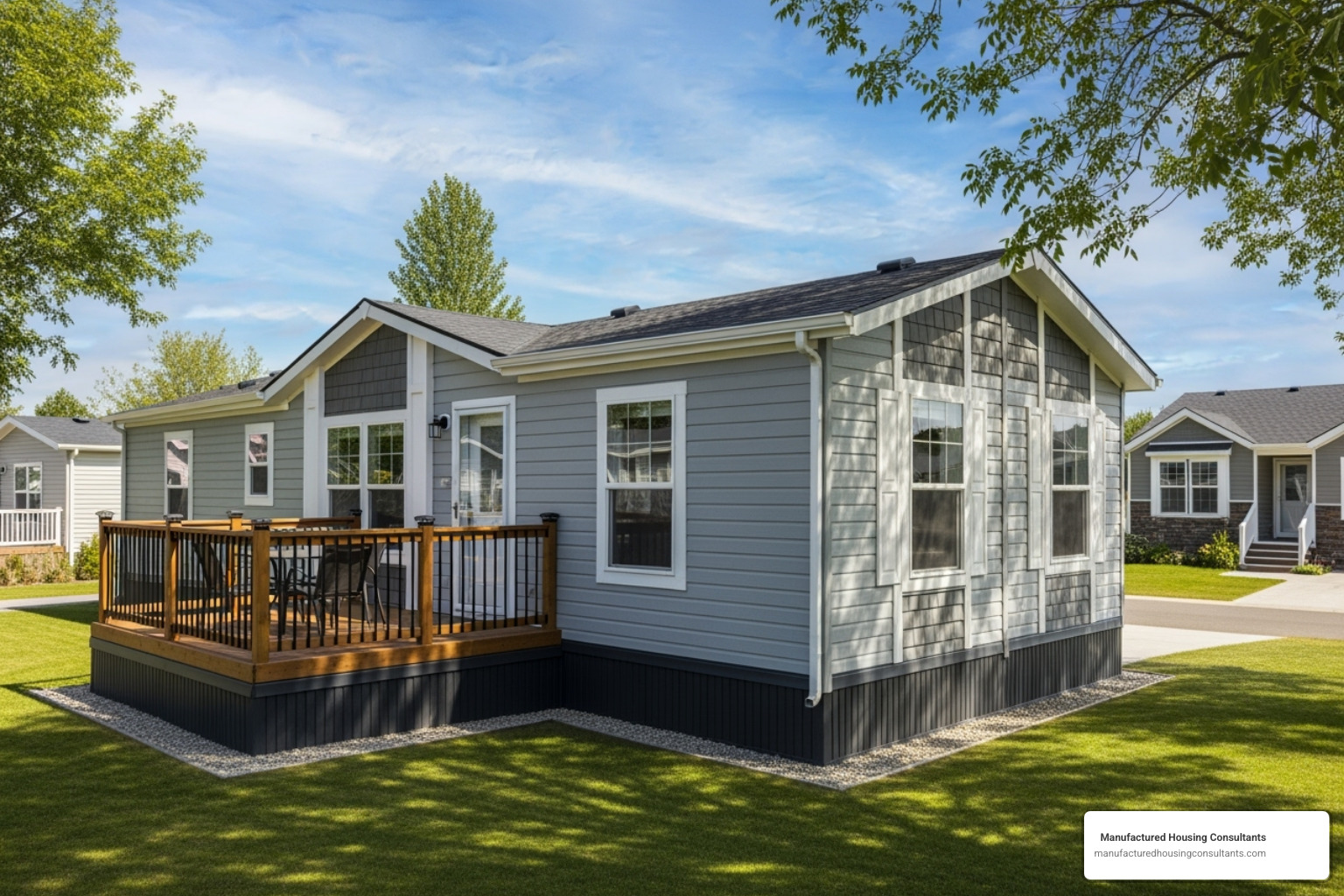
Driveways and walkways provide clean, stable access to your home. Skirting is essential for protecting the underbelly of your home from pests and moisture. Options range from affordable vinyl skirting to a more permanent look with brick or stone. Proper skirting must include adequate ventilation (at least 0.1 sq. meters per 50 sq. meters of floor area) and an access panel to prevent moisture buildup and allow for maintenance.
Decks and porches extend your living space outdoors—a must for enjoying the Texas weather. Fencing adds privacy and security, while landscaping with native Texas plants can beautify your property, aid drainage, and provide shade to reduce energy costs. For design ideas, explore our Manufactured Homes Design Complete Guide.
Budgeting and Avoiding Common Pitfalls
Site preparation costs for most Texas families typically fall between $15,000 and $50,000, but can exceed $100,000 for complex rural sites. Key cost drivers include the extent of land clearing, foundation type, and distance to utilities.
Always get detailed quotes from multiple experienced contractors, and don’t just pick the cheapest—reliability is worth paying for. As your consultant, we help you source and vet these contractors. However, we are not the contractors performing the work, nor do we offer home financing; we guide you through the process to ensure you work with the best professionals for your project. We recommend a contingency fund of 10-15% of your budget to cover unexpected issues like hidden rock or weather delays.
Avoid these common and costly mistakes:
- Skipping Soil Tests: Saving $500 now can cost you thousands in foundation repairs later.
- Underestimating Drainage: This is the #1 cause of water damage. Ensure your grading is done correctly.
- Ignoring Permits: This can lead to fines or even orders to move your home. Check with your local government sites first.
- Poor Access Planning: Make sure delivery trucks can actually reach your home site.
- Not Budgeting for Improvements: Skirting, driveways, and landscaping are essential finishing touches.
For more financial insights, read Things to Consider While Buying Land for Mobile and Manufactured Homes Part 2. And once installed, protect your investment with regular upkeep, as detailed in our Brief Guide Maintain Quality Manufactured Homes.
Build it Right, From the Ground Up
From planning and permits to grading and utilities, proper site preparation for mobile homes transforms raw land into a solid foundation for your future. Each step is crucial for protecting your investment for decades.
Trying to manage this process alone often leads to expensive mistakes. A skipped soil test or improper grading can cause foundation issues and water damage that cost thousands to repair. These are real-world problems we help Texas families avoid.
The value of professional guidance for your San Antonio area project cannot be overstated. Our team has managed site prep across Texas, specializing in the unique challenges of local properties. We understand the soil, weather, and permit requirements specific to our service locations. While we oversee the entire project, it’s important to note that we do not sell the manufactured homes themselves or perform the physical labor like excavation or utility installation. Our role is to act as your expert consultant, managing the process and coordinating with trusted, licensed contractors to ensure the ground beneath your home is as solid as the home itself.
Your manufactured home is a major investment. Start it on the right foot. For Texans navigating the complexities of land development, Manufactured Housing Consultants provides the expert guidance you need to get it right the first time.
Contact us for our Site Preparation Services to ensure your new home is built on a solid foundation.

